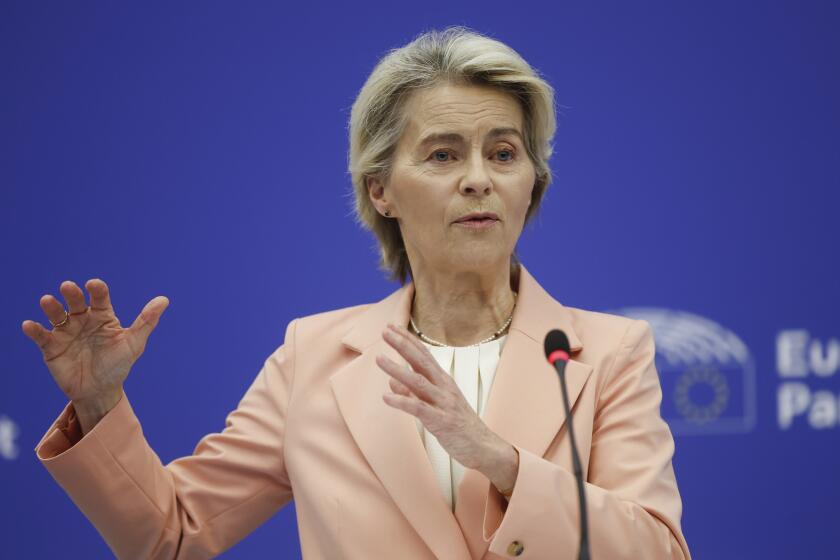Q&A: Guatemalan seeks answers in Honduran coup
The military-backed coup that ousted Honduran President Manuel Zelaya last year left behind a bitterly divided country that remains dangerously tense. This month, a five-member, internationally backed Truth and Reconciliation Commission was formally installed, amid much fanfare and low expectations, to investigate events before, during and after the coup.
Presiding over the panel is Eduardo Stein, an experienced diplomat and former vice president of Guatemala who helped negotiate an end to his nation’s brutal civil war. Stein spoke to The Times from Tegucigalpa, the Honduran capital, a day after the commission was sworn in — and it’s already being criticized by both sides of the political divide.
Given how polarized Honduras still is, more than 10 months after the coup, what do you realistically hope to achieve?
We think we can contribute to the clarification of some of the most delicate and stringent issues surrounding the events of June 28. But there are some things that happened that have antecedents of not just weeks but maybe months or years. Eruption was a date and time, but it took a long time to cook.
It is important to help several sectors of society who have antagonistic views to express their own experiences and what they went through, especially when they haven’t been able to do so.
Is the commission empowered to make actual recommendations?
There are some elements of irritation that the commission will make recommendations. Some leadership of very conservative groups resent the fact that in the official decree [forming the commission] the aspect of recommendations was included, while the Guaymuras agreement [which ended last year’s political impasse] doesn’t. But it does say, “Entregar al pueblo hondureno elementos para que no se repita.” In good Spanish, that means “recommend.”
An investigative commission that cannot recommend is worthless.
What will you do about those who won’t participate? Doesn’t that hurt your work?
In our work plan, no group will be excluded. We will be open for anybody who wants to bring in their own experiences. We are already receiving photographs, videotapes. ...
But Zelaya is saying he won’t cooperate; his supporters won’t cooperate. How do you deal with that?
We know there are doubters, that there are people in leadership in both the right and the left, if we use those terms, who are skeptical about the depth with which the commission will pursue its work and about the dedication and independence with which it will perform.
On the far right they consider us a Trojan horse that will promote constitutional reform. Among the Zelayistas and the resistance, they see us as just an extension of the coup, only window-dressing.
We are not worried about the extremes. We have found enough interest among groups who want to come forward. And we have to be surgically careful not to allow ourselves to be sucked into the political squabbles.
Will you assign blame?
You’re asking me the score before the game has even started. What we will not be doing is constituting ourselves as an inquisitional tribunal. We will be constructive, but there will be elements of clarification that will point to people who were responsible for various things.
Will you examine allegations of human rights abuses committed after the coup? [International and Honduran human rights organizations report dozens of illegal detentions and a number of torture, rape and kidnapping cases targeting Zelaya supporters since President Porfirio Lobo took office in January. Six journalists, including supporters and opponents of the coup, have been killed since March 1.]
Yes. We will delve into human rights cases and cases of corruption. We will deal with human rights violations before and after the events of June 28 and corruption cases related to it.
Is there any hope for reconciliation in Honduras?
I am fundamentally an optimistic person. We’ve seen horrendous things in my country and in other countries, and you can always hope for understanding among political leaderships if they are responsible to their people.
Are you deliberately avoiding the word “coup”?
That is precisely what we want to clarify. ... There are people here who argue it was a constitutional succession, with minor mishaps along the way. I went on record [shortly after the coup] saying that a forced expulsion of a popularly elected president, taken by military people and thrown out of the country, is a coup. ... Here, I have been reprimanded for taking sides. So now we are calling it an alteration of political institutionality, and we will examine whether there was a constitutional framework and if rights were respected.
More to Read
Sign up for Essential California
The most important California stories and recommendations in your inbox every morning.
You may occasionally receive promotional content from the Los Angeles Times.











